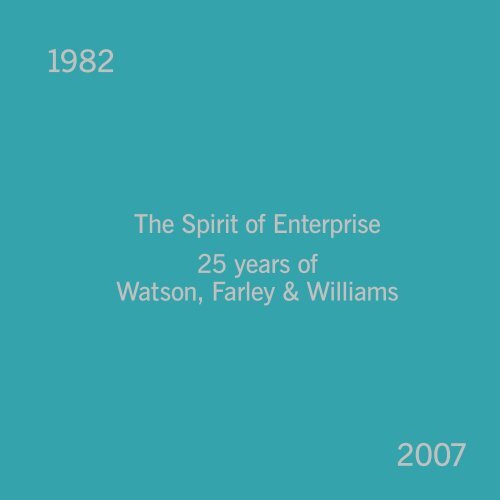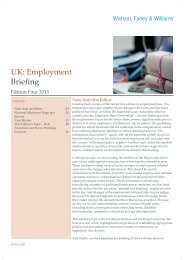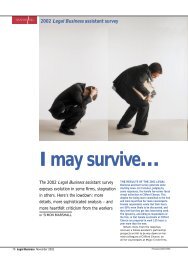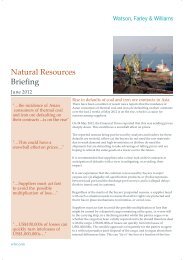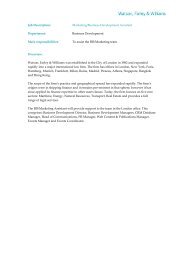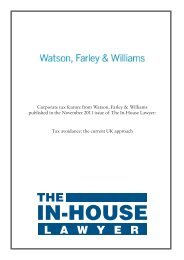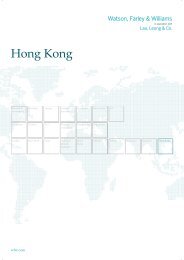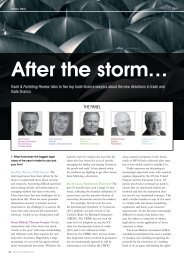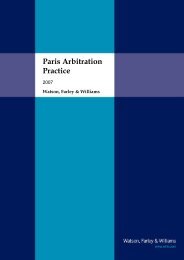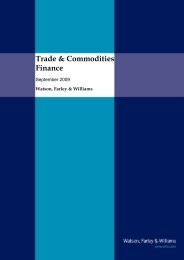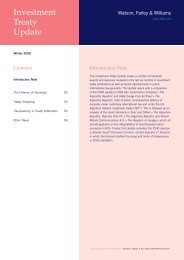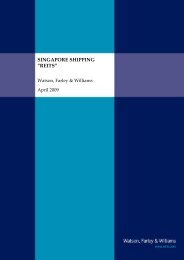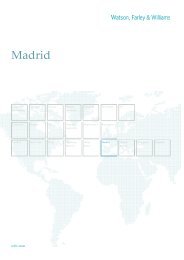The Spirit of Enterprise 25 years of Watson, Farley & Williams
The Spirit of Enterprise 25 years of Watson, Farley & Williams
The Spirit of Enterprise 25 years of Watson, Farley & Williams
Create successful ePaper yourself
Turn your PDF publications into a flip-book with our unique Google optimized e-Paper software.
1982<br />
<strong>The</strong> <strong>Spirit</strong> <strong>of</strong> <strong>Enterprise</strong><br />
<strong>25</strong> <strong>years</strong> <strong>of</strong><br />
<strong>Watson</strong>, <strong>Farley</strong> & <strong>Williams</strong><br />
2007
This history <strong>of</strong> <strong>25</strong> <strong>years</strong> <strong>of</strong> <strong>Watson</strong>, <strong>Farley</strong> & <strong>Williams</strong> is<br />
based on the many stories <strong>of</strong> current and former partners<br />
and members <strong>of</strong> staff.<br />
It reflects our firm’s journey to date and encapsulates the<br />
hard work and enjoyment we have all had serving our<br />
much valued clients.<br />
We hope you enjoy reading it.<br />
Frank Dunne<br />
Chairman<br />
<strong>Watson</strong>, <strong>Farley</strong> & <strong>Williams</strong> LLP<br />
www.wfw.com<br />
London Athens Paris New York Singapore Bangkok Rome Hamburg
Contents<br />
04 Chapter 1:<br />
Breakaway<br />
08 Chapter 2:<br />
Off like a rocket<br />
12 Chapter 3:<br />
Creating the WFW network<br />
16 Chapter 4:<br />
Downside <strong>of</strong> success<br />
22 Chapter 5:<br />
Charting a new course<br />
26 Chapter 6:<br />
Looking forward
Chapter 1:<br />
Breakaway<br />
Martin <strong>Watson</strong>, Alastair <strong>Farley</strong> & Ge<strong>of</strong>frey <strong>Williams</strong>
1981<br />
<strong>The</strong> <strong>Spirit</strong> <strong>of</strong> <strong>Enterprise</strong><br />
January<br />
Greece joins the European Community.<br />
January<br />
Ronald Reagan succeeds Jimmy Carter as<br />
US President.<br />
February<br />
Rupert Murdoch buys <strong>The</strong> Times and<br />
<strong>The</strong> Sunday Times for £12 million.<br />
March<br />
<strong>The</strong> British Social Democratic Party is launched<br />
at the Connaught Rooms in London.<br />
March<br />
<strong>The</strong> first London Marathon starts with<br />
7,500 runners.<br />
May<br />
François Mitterrand is elected President <strong>of</strong> France.<br />
July<br />
Lady Diana Spencer marries Charles,<br />
Prince <strong>of</strong> Wales.<br />
October<br />
Egyptian president Anwar Sadat is assassinated<br />
during a military parade.<br />
1982<br />
February<br />
Laker Airways collapses leaving passengers<br />
stranded and debts <strong>of</strong> over £200 million.<br />
<strong>25</strong> <strong>years</strong> <strong>of</strong> <strong>Watson</strong>, <strong>Farley</strong> & <strong>Williams</strong><br />
“It was 8.30 one Friday evening. I was<br />
working in my <strong>of</strong>fice when Alastair came in<br />
and, in an almost casual way, floated the idea<br />
<strong>of</strong> our setting up on our own.”<br />
So Martin <strong>Watson</strong> recalls the exact moment<br />
when Alastair <strong>Farley</strong> first raised the possibility<br />
<strong>of</strong> creating the firm that would become <strong>Watson</strong>,<br />
<strong>Farley</strong> & <strong>Williams</strong>. Given how low-key the<br />
suggestion was, it is perhaps not surprising that<br />
neither <strong>of</strong> them can remember exactly when this<br />
evening meeting took place. <strong>The</strong>y guess it must<br />
have been some time in late 1981. At the time<br />
Martin <strong>Watson</strong> and Alastair <strong>Farley</strong> were partners<br />
<strong>of</strong> Norton Rose, a long-established City law firm.<br />
Both were shipping finance lawyers, both had<br />
developed thriving practices.<br />
It was a heady time for the shipping<br />
industry. Through the 1970s new, better and<br />
bigger ships were being built to replace ageing<br />
fleets. London was the centre <strong>of</strong> international<br />
shipping: the UK government <strong>of</strong> the day was<br />
providing extensive assistance to the domestic<br />
shipping industry and the availability <strong>of</strong><br />
investment grants and generous capital<br />
allowances encouraged foreign shipping<br />
companies to set up in the UK. Japan was in the<br />
course <strong>of</strong> developing a shipbuilding industry.<br />
<strong>The</strong> bankers financing the transformation were<br />
pioneering new instruments and techniques.<br />
<strong>The</strong> first ever multicurrency shipping loan (in<br />
which Martin <strong>Watson</strong> was involved) and the<br />
first ship lease were both products <strong>of</strong> this era.<br />
However, the more that the shipping lawyers<br />
within Norton Rose capitalised on the surge in<br />
what was in essence an international business,<br />
the more their energy and enthusiasm stood<br />
them apart from those whose businesses were<br />
domestically focused. “<strong>The</strong> bright sparks in<br />
05
06<br />
Chapter 1: Breakaway<br />
Norton Rose were those doing foreign deals,”<br />
remembers Martin <strong>Watson</strong>. “From that came the<br />
thought that, maybe, we could do something<br />
ourselves.” That <strong>of</strong> itself might not necessarily<br />
have been reason to leave what was an excellent<br />
firm but Alastair <strong>Farley</strong>, who sat on one <strong>of</strong><br />
Norton Rose’s planning committees, found<br />
himself increasingly frustrated by the views<br />
<strong>of</strong> the firm’s partners who were reluctant to<br />
countenance significant overseas expansion.<br />
“We were failing to exploit what I could see<br />
from an international shipping point <strong>of</strong> view<br />
were fantastic international contacts. That<br />
certainly precipitated our leaving.”<br />
Ge<strong>of</strong>frey <strong>Williams</strong>, an aviation specialist at<br />
Norton Rose and six months Alastair <strong>Farley</strong>’s<br />
senior, was also sounded out about whether he<br />
might be interested to come with them. In the<br />
same casual way as he had done when floating<br />
the idea to Martin <strong>Watson</strong>, Alastair approached<br />
Ge<strong>of</strong>frey <strong>Williams</strong> with the proposal to leave<br />
Norton Rose and set up a new firm. When he<br />
received no immediate response to the idea, he<br />
assumed the latter was not interested. It later<br />
transpired that Alastair <strong>Farley</strong>’s suggestion had<br />
been, in his own words, “so Delphic that it<br />
completely passed Ge<strong>of</strong>frey by!” Only at the<br />
very point <strong>of</strong> their departure did Ge<strong>of</strong>frey<br />
<strong>Williams</strong> come to understand what was being<br />
proposed. He readily agreed to join the new<br />
venture, by which point <strong>Watson</strong> and <strong>Farley</strong><br />
(the order <strong>of</strong> names chosen by the flip <strong>of</strong> a coin)<br />
became <strong>Watson</strong>, <strong>Farley</strong> & <strong>Williams</strong>. <strong>The</strong> two<br />
primary movers (Alastair <strong>Farley</strong> and Martin<br />
<strong>Watson</strong>) gave themselves a year to make a<br />
success <strong>of</strong> the new venture, to which end each<br />
took out second mortgages on their homes to<br />
finance a year’s worth <strong>of</strong> overheads, which they<br />
estimated would be £180,000. If the new firm<br />
didn’t succeed, they reasoned, they could<br />
always find work elsewhere.<br />
Once their decision had been announced,<br />
they certainly had support from colleagues to<br />
come with them. David Warder, Chris Preston<br />
and, after some persuasion by Martin <strong>Watson</strong>,<br />
Andrew Pouteaux all joined the new firm as<br />
salaried partners. Frank Dunne started as an<br />
associate but would become a partner within a<br />
year. Secretaries and support staff were also<br />
happy to hand in their notice and make the<br />
move, among them Fiona Wood, Alastair<br />
<strong>Farley</strong>’s secretary, on whose organisational<br />
skills the new firm would depend. Procuring<br />
the most advanced IT systems was a priority –<br />
each secretary had access to a Wang word<br />
processing station, then considered to be the<br />
height <strong>of</strong> technological advancement.<br />
David Warder
<strong>The</strong> <strong>Spirit</strong> <strong>of</strong> <strong>Enterprise</strong><br />
Flying start<br />
Alastair <strong>Farley</strong> and Martin <strong>Watson</strong> had already<br />
handed in their resignations when a chance<br />
meeting at a Sunday lunch led to a totally<br />
unexpected turn <strong>of</strong> events. Alastair <strong>Farley</strong><br />
takes up the story:<br />
“At this lunch another lawyer asked whether<br />
I had contacted the Law Society to ask about the<br />
rules for taking clients. I had been to see the Law<br />
Society about setting up on our own but had not<br />
asked this very question. At that time we had not<br />
approached our clients and did not expect to be<br />
able to do so until we had actually left Norton Rose.<br />
What I discovered was that, under the rules,<br />
the existing firm had to give their clients the<br />
opportunity <strong>of</strong> going to the new firm, to ensure<br />
fair competition. <strong>The</strong> Law Society sent me some<br />
pro forma letters, which I took along to the<br />
managing partner and explained – slightly<br />
shamefacedly – that the letter needed to be<br />
sent out by Norton Rose. You can imagine the<br />
reaction. In the end, a much longer letter was<br />
sent to some, but not all clients, which referred<br />
to a number <strong>of</strong> partners retiring, others being<br />
made up and then, almost as a kind <strong>of</strong> PS, the<br />
fact that <strong>Farley</strong>, <strong>Watson</strong> and <strong>Williams</strong> were<br />
leaving the firm. <strong>The</strong> responses, all very positive,<br />
started coming in a month or so before we left<br />
and suddenly we had a law firm and a business<br />
in the making.”<br />
This was all at a time in the City where moves<br />
such as this were almost unheard-<strong>of</strong>; a mouldbreaking<br />
move was afoot.<br />
<strong>25</strong> <strong>years</strong> <strong>of</strong> <strong>Watson</strong>, <strong>Farley</strong> & <strong>Williams</strong><br />
Chris Preston<br />
Frank Dunne<br />
07
Chapter 2:<br />
Off like a<br />
rocket<br />
Cotts House, 1982
1982<br />
<strong>The</strong> <strong>Spirit</strong> <strong>of</strong> <strong>Enterprise</strong><br />
April<br />
<strong>The</strong> Falklands War begins.<br />
June<br />
Prince William is born at St Mary’s Hospital, London.<br />
October<br />
Helmut Kohl replaces Helmut Schmidt as Chancellor<br />
<strong>of</strong> Germany.<br />
October<br />
Sony launches the world’s first Compact Disc player.<br />
November<br />
<strong>The</strong> fourth terrestrial television channel, Channel 4, is<br />
launched in England, Scotland and Northern Ireland.<br />
November<br />
Soviet invasion <strong>of</strong> Afghanistan.<br />
1983<br />
June<br />
Margaret Thatcher wins a landslide victory to secure<br />
her 2 nd term as UK Prime Minister.<br />
September<br />
Korean Airlines Flight 007 is shot down by a Soviet<br />
Union jet fighter over Sakhalin Island.<br />
Dramatic the effect may have been in the City<br />
but outside the Square Mile the world had its<br />
attention on other matters.<br />
In response to the invasion <strong>of</strong> the Falklands<br />
by Argentina on 2 nd April, a task force was being<br />
assembled to set sail to the south Atlantic to<br />
recapture the islands. Without great fanfare<br />
<strong>25</strong> <strong>years</strong> <strong>of</strong> <strong>Watson</strong>, <strong>Farley</strong> & <strong>Williams</strong><br />
<strong>Watson</strong>, <strong>Farley</strong> & <strong>Williams</strong> opened for business<br />
on 1st May 1982. Apart from the machinations<br />
involving <strong>The</strong> Law Society rules, there was also<br />
a change <strong>of</strong> plan forced upon it when it came to<br />
finding <strong>of</strong>fice space. Everything was all set for<br />
<strong>of</strong>fices in Devonshire Square but another<br />
company came up with a higher bid for the lease<br />
and secured the space. “<strong>The</strong> irony was that it<br />
was a client <strong>of</strong> mine, who had not realised they<br />
were bidding against us,” recalls Alastair <strong>Farley</strong>,<br />
“and then they asked me for a reference!”.<br />
Instead, <strong>of</strong>fices were found in Cotts House,<br />
<strong>of</strong>f Camomile Street, and – perhaps most<br />
awkward <strong>of</strong> all – literally on the other side<br />
<strong>of</strong> the road from Norton Rose’s <strong>of</strong>fices.<br />
<strong>The</strong> three founding partners, three other<br />
partners, two assistant solicitors, four secretaries,<br />
one IT expert, a part-time telex operator and<br />
an <strong>of</strong>fice boy got down to business in these<br />
somewhat cramped <strong>of</strong>fices. “It was chaos,”<br />
remembers Andrew Cunningham <strong>of</strong> Moore<br />
Stephens, the auditors for both Norton Rose<br />
and <strong>Watson</strong>, <strong>Farley</strong> & <strong>Williams</strong>, “with papers<br />
stacked high on the floors and people running<br />
around.” Frank Dunne and Chris Preston shared<br />
an <strong>of</strong>fice in what was really a storeroom in the<br />
basement, adjacent to the car park, and Kim<br />
Walkling, who joined soon after the start from<br />
Slaughter and May, worked from a window<br />
ledge! But that did not matter: there was work<br />
to be done right from the moment the firm<br />
opened. Most <strong>of</strong> those contacted came over to<br />
the new firm and, within a month, the firm<br />
had 19 financial institutions as clients.<br />
That they and other shipping clients switched<br />
their custom to a small, untried firm over a longestablished,<br />
major City law firm was due to a<br />
number <strong>of</strong> factors. <strong>The</strong> first was the nature <strong>of</strong><br />
shipping law practice, in which individual<br />
09
10<br />
Chapter 2: Off like a rocket<br />
relationships, rather than institutional ties,<br />
were the norm. Whether shipowners, many<br />
<strong>of</strong> which were family-run businesses, or the<br />
banks financing shipping business, it was with<br />
individuals that the lawyers dealt and with<br />
whom pr<strong>of</strong>essional relationships were forged.<br />
<strong>The</strong>y were set apart from their competitors by<br />
a deep understanding <strong>of</strong> the shipping industry,<br />
from all angles.<br />
Secondly, the founders <strong>of</strong> the firm and those<br />
who joined them had established a formidable<br />
reputation. Andrew Cunningham remembers<br />
the founders making an excellent combination:<br />
“Ge<strong>of</strong>frey had gravitas, an expert in aircraft<br />
leasing, Martin was a workaholic dealmaker, and<br />
Alastair the best commercial shipping lawyer I<br />
have ever come across, someone with enormous<br />
intellectual capability, very deep knowledge <strong>of</strong><br />
the law and, pr<strong>of</strong>essionally, cold as ice. In a crisis,<br />
you would never want him on the other side.”<br />
<strong>The</strong>ir reputation was such that when David<br />
Osborne sounded out some partners <strong>of</strong> Linklaters<br />
(where he was then working) about the wisdom<br />
<strong>of</strong> leaving to join the new firm, he was advised<br />
that he had nothing to fear. Indeed, he handed<br />
in his resignation at Linklaters before <strong>Watson</strong>,<br />
<strong>Farley</strong> & <strong>Williams</strong> had even come into existence,<br />
starting a couple <strong>of</strong> months after it opened.<br />
It may also have assisted the decision that<br />
<strong>Watson</strong>, <strong>Farley</strong> was <strong>of</strong>fering a 20 per cent higher<br />
salary for its new recruits than they could<br />
expect to receive from the big City firms.<br />
Thirdly, the energy and enthusiasm <strong>of</strong> the<br />
founders, allied to determined entrepreneurialism<br />
helped to convince the owners, banks and other<br />
clients that their faith in the new firm was wholly<br />
justified. <strong>The</strong> start-up finance, augmented by a<br />
loan provided by another firm <strong>of</strong> solicitors to<br />
whom <strong>Watson</strong>, <strong>Farley</strong> & <strong>Williams</strong> undertook to<br />
refer private client work from their corporate<br />
clients, was soon superseded by a regular bank<br />
facility from Hill Samuel, as the new firm was<br />
able to show work-in-progress and a healthy<br />
cash flow.<br />
“We went <strong>of</strong>f like a rocket,” says Frank Dunne.<br />
“<strong>The</strong>re was a mountain <strong>of</strong> work. For the first<br />
year at least, and probably longer than that, I<br />
and everybody else worked seven days a week.”<br />
<strong>The</strong> new firm was underpinned by a spirit <strong>of</strong><br />
enterprise, something that is frequently referred<br />
to by law firms today but highly unusual in the<br />
early 1980s. As Martin <strong>Watson</strong> puts it, “We<br />
wanted a niche firm, and we wanted people to<br />
be successful and to enjoy themselves. We felt<br />
that if we found the right people and worked<br />
incredibly hard, everything would fall into place.”<br />
It certainly did. By the end <strong>of</strong> the first year the<br />
new firm had brought in some £840,000 in fee<br />
income. By April 1983 there were six partners,<br />
13 other fee-earners and a total staff <strong>of</strong> 27. Even<br />
before the end <strong>of</strong> the first year, in March 1983,<br />
the firm had outgrown the basic accommodation<br />
<strong>of</strong> Cotts House and moved to Navigation House<br />
in Aldgate.<br />
<strong>The</strong> practice divided, broadly, between<br />
shipping and shipping finance (Martin <strong>Watson</strong>,<br />
Alastair <strong>Farley</strong>, David Warder and Frank Dunne),<br />
aviation and leasing finance (Ge<strong>of</strong>frey <strong>Williams</strong>),<br />
<strong>of</strong>fshore oil and gas contracting (Andrew<br />
Pouteaux) and tax (Chris Preston). Others soon<br />
joined. “Word got out around the City that we<br />
were rather dangerous to have meetings with,”<br />
jokes David Warder, “in case we approached<br />
the young associates on the other side after<br />
the meeting and <strong>of</strong>fered them a job!” It soon<br />
became clear that the new firm would need
<strong>The</strong> <strong>Spirit</strong> <strong>of</strong> <strong>Enterprise</strong><br />
a litigation capability, and that gap was filled<br />
with the arrival <strong>of</strong> Charles Smallwood in<br />
January 1983 from Holman, Fenwick & Willan<br />
in Hong Kong and shortly after that by Simon<br />
Curtis from Ince & Co.<br />
Strength <strong>of</strong> a handshake<br />
<strong>The</strong> manner in which Charles Smallwood joined<br />
<strong>Watson</strong>, <strong>Farley</strong> & <strong>Williams</strong> shows the confidence<br />
that people had in the new firm, as Alastair<br />
<strong>Farley</strong> relates:<br />
“Charles was working at Holman Fenwick<br />
in Hong Kong. He phoned up, and expressed<br />
interest to join us, after seeing an ad we had<br />
placed advertising for litigation lawyers. Some<br />
time in late 1982 I stopped <strong>of</strong>f in Hong Kong on<br />
my way back from the Far East on one trip and<br />
arranged to have dinner with him. By the end <strong>of</strong><br />
the dinner we had agreed terms, and Charles<br />
had mentioned that he would be free to start at<br />
the beginning <strong>of</strong> January. On my return to<br />
London, I wrote Charles a letter confirming<br />
the terms we had agreed. I never heard back<br />
so I assumed, much to my regret, that he had<br />
changed his mind. <strong>The</strong>n, on 2 nd January, Charles<br />
turned up in the <strong>of</strong>fice. I was astonished, and<br />
told him that I had not heard from him since our<br />
meeting, to which Charles replied that he had<br />
never received the letter that I had sent him!<br />
My letter had gone by sea mail. So Charles joined<br />
us on the basis <strong>of</strong> a handshake in a Japanese<br />
restaurant in Hong Kong at midnight.”<br />
<strong>25</strong> <strong>years</strong> <strong>of</strong> <strong>Watson</strong>, <strong>Farley</strong> & <strong>Williams</strong><br />
<strong>Watson</strong>, <strong>Farley</strong> & <strong>Williams</strong> became<br />
renowned as outstanding lawyers, problem<br />
solvers, commercially astute and, vitally, well<br />
versed in the sectors in which they operated.<br />
More than this, however, “the founders inculcated<br />
in us all a gold dust mentality,” as Frank Dunne<br />
recalls. “That was one <strong>of</strong> the huge differences in<br />
culture between WFW and the firms we had<br />
left. In this new small firm we had a relatively<br />
small number <strong>of</strong> core clients, who, <strong>of</strong> course,<br />
meant a huge amount to us. <strong>The</strong>y were the ‘gold<br />
dust’ and the absolute need to give them an<br />
outstanding service was deeply ingrained in<br />
all <strong>of</strong> us. Because <strong>of</strong> our commitment, the<br />
clients were extraordinarily well served.”<br />
<strong>The</strong> firm’s lawyers travelled incessantly to<br />
ensure that their clients’ needs were attended to,<br />
Martin <strong>Watson</strong> concentrating on his clients in<br />
northern Europe and Scandinavia and Alastair<br />
<strong>Farley</strong> on his clients in the Mediterranean.<br />
“Shipping is a very personal business,” Alastair<br />
<strong>Farley</strong> explains. “Many <strong>of</strong> the shipowning<br />
businesses were family-owned, passing down<br />
from generation to generation. Even on the<br />
financing side, because <strong>of</strong> its specialist nature,<br />
shipping business was dealt with by a certain<br />
coterie <strong>of</strong> individuals, who would stay in that<br />
line <strong>of</strong> work even when they moved banks. We<br />
served them well and believed that, as a result,<br />
they stayed loyal to us. At the time, I remember<br />
people coming up to us and saying that we<br />
must have had the most marvellous marketing<br />
operation because <strong>of</strong> our top clients. But the<br />
truth was, it was all word <strong>of</strong> mouth, being in<br />
the market place and doing the deals.”<br />
11
Chapter 3:<br />
Creating the<br />
WFW network<br />
<strong>The</strong> partners <strong>of</strong> <strong>Watson</strong>, <strong>Farley</strong> & <strong>Williams</strong>, New York <strong>of</strong>fice, 1990
1984<br />
<strong>The</strong> <strong>Spirit</strong> <strong>of</strong> <strong>Enterprise</strong><br />
October<br />
<strong>The</strong> Grand Hotel, Brighton, is bombed during the<br />
Coservative Party Conference.<br />
November<br />
US presidential election: Ronald Reagan defeats<br />
Walter F. Mondale.<br />
1985<br />
March<br />
Mikhail Gorbachev becomes leader <strong>of</strong> the Soviet Union.<br />
1986<br />
April<br />
Chernobyl nuclear disaster.<br />
October<br />
‘Big Bang’ deregulation <strong>of</strong> the London Stock Exchange.<br />
1987<br />
June<br />
Margaret Thatcher wins a 3 rd term as Prime Minister <strong>of</strong><br />
the United Kingdom.<br />
October<br />
‘Black Monday’ stock market levels fall sharply.<br />
1988<br />
January<br />
<strong>The</strong> Soviet Union begins its program <strong>of</strong> economic<br />
restructuring – perestroika.<br />
1989<br />
January<br />
George H. Bush is elected President <strong>of</strong> the United States.<br />
<strong>25</strong> <strong>years</strong> <strong>of</strong> <strong>Watson</strong>, <strong>Farley</strong> & <strong>Williams</strong><br />
For an internationally minded group <strong>of</strong><br />
practitioners doing international work in a<br />
global business, it was always the wish –<br />
if not the stated strategy – to open <strong>of</strong>fices<br />
outside London.<br />
London remained the principal centre for<br />
international shipping but other centres also<br />
existed and were attracting the involvement <strong>of</strong><br />
the many and varied component segments that in<br />
total made up the worldwide shipping business.<br />
Greece and Norway were natural jurisdictions<br />
in which first to look to set up overseas <strong>of</strong>fices.<br />
Greeks and the shipping business are virtually<br />
synonymous, added to which Alastair <strong>Farley</strong><br />
had several prominent clients in Greece. Frank<br />
Dunne had lobbied to open up in Greece for<br />
some time, dating back to his time with Norton<br />
Rose. <strong>The</strong> clinching factor was a request by an<br />
American banking client for <strong>Watson</strong>, <strong>Farley</strong> to<br />
have a local presence to handle loan financings<br />
to its Greek customers. And so it was that, in<br />
March 1984, Frank Dunne took up residence in<br />
the Piraeus <strong>of</strong>fices <strong>of</strong> a local lawyer, <strong>The</strong>o<br />
Sioufas, to open <strong>Watson</strong>, <strong>Farley</strong> & <strong>Williams</strong>’s<br />
first overseas <strong>of</strong>fice.<br />
It was not a moment too soon, but not for<br />
the expected reasons. Frank Dunne’s arrival<br />
coincided with a catastrophic decline in the<br />
shipping market, a consequence <strong>of</strong> serious overordering<br />
<strong>of</strong> new tonnage in the late 1970s and<br />
declining charter rates, resulting in customers<br />
getting into cash-flow difficulties. Instead <strong>of</strong><br />
handling new loans, as he had anticipated,<br />
Frank Dunne was immediately advising on<br />
workouts, restructurings and the occasional<br />
business collapse. Not good for the shipping<br />
sector, but undoubtedly good for the new <strong>of</strong>fice.<br />
As it happened, too, WFW was able to capitalise<br />
13
14<br />
Chapter 3: Creating the WFW network<br />
on some advanced communications technology<br />
to its distinct advantage: a fax machine, which,<br />
astonishingly, no other law firm in Greece then<br />
possessed, and an electronic link to the firm’s<br />
computer database in London, an almost<br />
unheard-<strong>of</strong>, and very expensive, thing in<br />
the 1980s.<br />
<strong>The</strong> success <strong>of</strong> the <strong>of</strong>fice in Greece gave<br />
the firm confidence to open elsewhere. Peter<br />
Cull was sent out to open an <strong>of</strong>fice in Oslo,<br />
in September 1986, making <strong>Watson</strong>, <strong>Farley</strong> &<br />
<strong>Williams</strong> the first foreign law firm to open in<br />
Norway. <strong>The</strong> decision was taken purely to<br />
practise English law, and not to take on<br />
Norwegian qualified lawyers – so as not to<br />
upset the many Norwegian law firms from<br />
whom the firm received referrals – which was<br />
later to prove a disadvantage. But the move<br />
was certainly vindicated. As in Greece, the<br />
business flowed in and, as with the Piraeus<br />
<strong>of</strong>fice, the timing <strong>of</strong> the move was propitious.<br />
Norwegian ship owners started to register<br />
their vessels with ‘flags <strong>of</strong> convenience’ in<br />
Liberia, Panama and other tax-friendly<br />
jurisdictions. At the same time as Nigel<br />
Thomas took over from Peter Cull in 1988,<br />
the Norwegian government introduced socalled<br />
‘KS’ schemes, which permitted limited<br />
partnership ownership <strong>of</strong> vessels. WFW’s<br />
practice flourished; the firm had originally<br />
anticipated that Oslo might serve as a base for<br />
Swedish business, but it turned out to be a big<br />
enough market in its own right.<br />
At the same time the London <strong>of</strong>fice was<br />
developing fast, and diversifying. As well as<br />
litigation, the firm built its company and<br />
corporate work (recruiting William Fossick<br />
from Norton Rose, much to the relief <strong>of</strong> those<br />
who had been advising on PLC matters before<br />
his arrival) and general banking and finance<br />
(taking on Ge<strong>of</strong>frey Wynne and Neil Cuthbert,<br />
both from the Royal Bank <strong>of</strong> Canada). Ge<strong>of</strong>frey<br />
<strong>Williams</strong> expanded his practice to start doing<br />
film finance (“Ge<strong>of</strong>frey was our leasing guru,”<br />
says Alastair <strong>Farley</strong>). Specialists were recruited<br />
to meet the demands from clients for a broader<br />
range <strong>of</strong> services – Maria Llewellyn to develop<br />
a property practice, Richard Whish to provide<br />
competition law expertise and later Liz Buchan<br />
on employment and immigration, “We never<br />
had ‘departments’, and in fact Alastair forbade<br />
us from using the term,” remembers Frank<br />
Dunne. <strong>The</strong> focus <strong>of</strong> the firm’s energy was<br />
entirely on servicing existing clients in a<br />
booming market and winning new business.<br />
No unnecessary time was spent on management.<br />
“We had a very simple philosophy, that no feeearner<br />
should spend more than 10 per cent <strong>of</strong><br />
his time on management,” jokes Alastair <strong>Farley</strong>.<br />
Even when William Fossick became the firm’s<br />
first managing partner in 1987, that was on the<br />
basis that he would not spend more than a<br />
quarter <strong>of</strong> his time on management.<br />
A simple philosophy, and a very successful<br />
one. Fee income rose to more than £2 million at<br />
the end <strong>of</strong> the second year, £3.5 million at the<br />
end <strong>of</strong> the third and £4.6 million at the end <strong>of</strong><br />
the fourth. By the end <strong>of</strong> the decade, fee<br />
income would exceed £10 million. After the<br />
first couple <strong>of</strong> <strong>years</strong>, more were brought into<br />
equity partnership (another seven by 1985 and<br />
a further 10 by the end <strong>of</strong> the decade). <strong>The</strong>re<br />
were five times as many fee earners in 1990 as<br />
there had been in 1983. To accommodate all<br />
these extra people, the firm moved from its<br />
Navigation House <strong>of</strong>fices to Minories House,<br />
in January 1988. To begin with one floor (out <strong>of</strong>
<strong>The</strong> <strong>Spirit</strong> <strong>of</strong> <strong>Enterprise</strong><br />
five) was not occupied in anticipation <strong>of</strong><br />
subletting it; that never happened since<br />
the space was soon needed and continued<br />
expansion led to an annex in Leadenhall Street.<br />
In 1991, less than four <strong>years</strong> after moving to<br />
the Minories, the London <strong>of</strong>fice moved again,<br />
to the current premises in Appold Street.<br />
<strong>Watson</strong>, <strong>Farley</strong> & <strong>Williams</strong> had established a<br />
formidable reputation in the world <strong>of</strong> shipping,<br />
and found itself the subject <strong>of</strong> some welcome<br />
approaches by others to join forces. In Paris,<br />
Marie-Josée Heitzler, with whom the firm had<br />
had many dealings as a lawyer at the French<br />
export credit Banque Francaise des Commerce<br />
Nationwide publicity<br />
Immediately after the New York <strong>of</strong>fice was<br />
established, the United States Congress passed<br />
the Oil Pollution Act in 1990. This had been<br />
passed in the wake <strong>of</strong> the Exxon Valdez oil spill<br />
the previous year. This legislation was given<br />
nationwide coverage on US television. One <strong>of</strong><br />
the experts upon whom the networks called<br />
was Thad Miller, one <strong>of</strong> the seven partners who<br />
had joined from Burlingham Underwood &<br />
Lord. Martin <strong>Watson</strong>, who was in New York<br />
for the opening <strong>of</strong> the <strong>of</strong>fice, was thrilled at<br />
the publicity:<br />
“I was watching television in my hotel room,<br />
when Thad Miller came on the screen and, under<br />
his picture, our name, <strong>Watson</strong>, <strong>Farley</strong> & <strong>Williams</strong>.<br />
We couldn’t have hoped for better publicity.”<br />
<strong>25</strong> <strong>years</strong> <strong>of</strong> <strong>Watson</strong>, <strong>Farley</strong> & <strong>Williams</strong><br />
Extérieur, was on the point <strong>of</strong> retiring. She was<br />
keen for the firm to take over her work, and<br />
<strong>Watson</strong>, <strong>Farley</strong> & <strong>Williams</strong>, for its part, was<br />
only too keen to do just that. <strong>The</strong> solution was<br />
to open an <strong>of</strong>fice, in which Mme (as she was<br />
always respectfully known) Heitzler took<br />
some space as she wound down her practice.<br />
<strong>The</strong> firm turned to Nigel Moss, then an inhouse<br />
counsel at BSFE (Banque de la Société<br />
Financière Européenne) and previously a<br />
colleague at Norton Rose, to do the honours,<br />
at the end <strong>of</strong> July 1989.<br />
Across the Atlantic, too, an opportunity for<br />
expansion landed on the firm’s plate. Seven<br />
partners <strong>of</strong> the New York law firm, Burlingham<br />
Underwood & Lord, looking to internationalise<br />
their practice beyond New York, saw in <strong>Watson</strong>,<br />
<strong>Farley</strong> & <strong>Williams</strong> just the sort <strong>of</strong> practice that<br />
could <strong>of</strong>fer that. For WFW, having its own New<br />
York <strong>of</strong>fice <strong>of</strong>fered the prospect <strong>of</strong> capturing for<br />
itself the million dollars plus <strong>of</strong> business that it<br />
was referring to Burlingham Underwood and<br />
other law firms in New York each year. It also<br />
presented a golden opportunity to follow<br />
important US banking clients to their roots.<br />
<strong>The</strong> seven partners, whose practices covered<br />
ship finance and litigation, led by John Osborne,<br />
accordingly joined the firm and set up the New<br />
York <strong>of</strong>fice in January 1990. With this move, the<br />
firm had the distinction <strong>of</strong> becoming one <strong>of</strong> the<br />
first English law firms, if not the very first, to<br />
have US lawyers as partners. David Osborne<br />
moved to New York from London to integrate<br />
the new <strong>of</strong>fice into the firm and to provide<br />
English law advice.<br />
15
Chapter 4:<br />
Downside<br />
<strong>of</strong> success<br />
Partner retreat 1982<br />
Minories House, 1988
1990<br />
<strong>The</strong> <strong>Spirit</strong> <strong>of</strong> <strong>Enterprise</strong><br />
August<br />
Iraq invades Kuwait, leading to the Gulf War.<br />
1991<br />
June<br />
Boris Yeltsin is elected President <strong>of</strong> Russia.<br />
1992<br />
April<br />
John Major wins the UK General Election.<br />
1993<br />
January<br />
Bill Clinton is voted President <strong>of</strong> the United States.<br />
1994<br />
May<br />
<strong>The</strong> Channel Tunnel opens.<br />
1995<br />
May<br />
Jacques Chirac is elected President <strong>of</strong> France.<br />
1996<br />
August<br />
<strong>The</strong> Prince and Princess <strong>of</strong> Wales are divorced.<br />
1997<br />
May<br />
Tony Blair wins a landslide UK General Election.<br />
2000<br />
January<br />
Y2K passes without widespread computer failure.<br />
<strong>25</strong> <strong>years</strong> <strong>of</strong> <strong>Watson</strong>, <strong>Farley</strong> & <strong>Williams</strong><br />
“We were riding the crest <strong>of</strong> a wave.” As<br />
<strong>Watson</strong>, <strong>Farley</strong> & <strong>Williams</strong> entered its second<br />
decade, this was the assessment <strong>of</strong> the firm’s<br />
position by founding partner Alastair <strong>Farley</strong>.<br />
It seemed too good to be true, and it was.<br />
<strong>The</strong> heady growth <strong>of</strong> the 1980s and the early<br />
1990s, which saw fee income double in the<br />
space <strong>of</strong> two <strong>years</strong> to reach £28 million, was not<br />
matched by attention to the firm’s direction or<br />
financial foundations.<br />
<strong>The</strong> background to the opening <strong>of</strong> a Moscow<br />
<strong>of</strong>fice showed the firm at its best and its worst.<br />
A high-level contact within the Soviet shipping<br />
ministry cultivated over many <strong>years</strong> by Alastair<br />
<strong>Farley</strong> yielded rewards in the late 1980s as the<br />
Soviet Union, in the process <strong>of</strong> collapsing,<br />
endeavoured to commercialise its fleet. That<br />
resulted in the financial independence from<br />
the Ministry <strong>of</strong> Merchant Marine <strong>of</strong> the USSR’s<br />
international shipping organisation and the<br />
ship-operating companies located all over the<br />
USSR and in the newly emerging republics.<br />
Almost overnight, there were more than a<br />
dozen potential new clients. <strong>Watson</strong>, <strong>Farley</strong><br />
shipping partners took <strong>of</strong>f to the far corners <strong>of</strong><br />
what had been the Soviet Union, from Riga in<br />
the west, to Murmansk in the Arctic north,<br />
Vladivostock in the far east and Odessa on the<br />
Black Sea, in pursuit <strong>of</strong> new business. “It was<br />
an excellent example <strong>of</strong> our buccaneering<br />
spirit,” says Alastair <strong>Farley</strong>.<br />
It seemed only natural that this would be<br />
followed up by creating an <strong>of</strong>fice in Moscow.<br />
Other foreign law firms were falling over<br />
themselves to open in the Russian capital.<br />
<strong>Watson</strong>, <strong>Farley</strong> & <strong>Williams</strong> followed suit,<br />
opening in October 1993. It was not an<br />
17
18<br />
Chapter 4: Downside <strong>of</strong> success<br />
illogical move, since there were long-standing<br />
Russian contacts who could be serviced, but the<br />
fact <strong>of</strong> the matter was that Moscow was not a<br />
shipping finance centre. <strong>The</strong> loans and deals<br />
associated with shipping were done by Russian<br />
deal makers who chose to use London.<br />
“Our clients moved out, as we moved in,”<br />
remembers David Warder. Michael Greville,<br />
who went out to open the <strong>of</strong>fice, did more<br />
corporate and securities business than shipping<br />
work. Opening in Moscow was borne more <strong>of</strong><br />
impulse rather than careful consideration.<br />
<strong>The</strong> collapse <strong>of</strong> foreign investment to Russia<br />
following the 1998 financial crisis led to<br />
the demise and ultimate closure <strong>of</strong> Moscow<br />
in February 2002, when the lease on the<br />
<strong>of</strong>fice expired.<br />
Indeed, there was a sense in which the firm<br />
was being too unconstrained in general. <strong>The</strong>re<br />
were continuing efforts to break into new areas<br />
<strong>of</strong> practice, particularly general banking and<br />
finance, which were not successful and not<br />
helped by the recession in the early 1990s. <strong>The</strong><br />
firm was moving out <strong>of</strong> its specialist fields <strong>of</strong><br />
practice, where it had established a formidable<br />
reputation and could charge commensurately<br />
high fees, into areas dominated by others, where<br />
it had to rely on other means to penetrate the<br />
market. That meant, in effect, competing on<br />
price rather than expertise.<br />
As David Warder explains: “We found it<br />
difficult to get the right people, especially after<br />
the first wave when we all had the shared vision<br />
<strong>of</strong> the new venture. It was the old conundrum:<br />
the people you want don’t want to move, and the<br />
people who want to move aren’t necessarily the<br />
people you want. But a partnership depends on<br />
personalities and people getting on with and<br />
integrating into the existing group. For some<br />
it worked, but for too many it didn’t. It was<br />
an error-prone business, at which we have<br />
become more astute.” However, the firm’s<br />
entrepreneurial instincts did serve it well in<br />
the creation <strong>of</strong> a central and eastern European<br />
practice out <strong>of</strong> which would emerge a<br />
flourishing energy practice.<br />
<strong>The</strong>re was some disquiet about the way<br />
in which the firm was being managed.<br />
Disagreements surfaced about the direction<br />
in which the firm was heading, eventually<br />
developing into a full-blown rift between<br />
those who believed that the firm should<br />
stick to its core strengths (shipping and<br />
asset finance), and those who argued for a<br />
diversification and expansion into new areas<br />
<strong>of</strong> practice. Matters reached a head when two<br />
litigation partners in the first group, Simon<br />
Curtis and Mark Davis, left in 1996 to create<br />
their own firm. <strong>The</strong>ir departure was a serious<br />
blow, as many people today freely admit.<br />
“Simon was one the best lawyers we had,”<br />
reflects Alastair <strong>Farley</strong>, “brilliant at getting<br />
across, simply, complexities to clients. We<br />
were all sad to see him leave.”<br />
<strong>The</strong> ship needed steadying. Earlier, a<br />
management consultant had been appointed<br />
to advise how the firm should go forward.<br />
Among his recommendations was the need<br />
for stronger management, including a practice<br />
group structure organised across <strong>of</strong>fices.<br />
A management committee <strong>of</strong> three was<br />
formed, followed in 1995 by an election, for<br />
the first time, <strong>of</strong> a managing partner, David<br />
Warder, who divided his time equally between<br />
management and client work. Pr<strong>of</strong>essionals<br />
were hired to take control <strong>of</strong> the firm’s support
<strong>The</strong> <strong>Spirit</strong> <strong>of</strong> <strong>Enterprise</strong><br />
<strong>The</strong> seeds <strong>of</strong> the energy practice<br />
In the summer <strong>of</strong> 1993 Martin <strong>Watson</strong> and<br />
Charles Walford approached Douglas Wardle,<br />
then at McKenna & Co specialising in<br />
privatisation and corporate work in eastern<br />
Europe, to see if he would be interested in<br />
moving to WFW as a partner. He agreed,<br />
bringing with him a small team from McKennas.<br />
<strong>The</strong> next three <strong>years</strong> were spent working on<br />
a variety <strong>of</strong> corporate privatisations in a number<br />
<strong>of</strong> eastern European countries including the<br />
Baltics, the Balkans, Bulgaria and Romania.<br />
Indeed, for a couple <strong>of</strong> <strong>years</strong> the firm headed<br />
Privatisation International’s league table as the<br />
international law firm with the highest number<br />
<strong>of</strong> privatisations in eastern Europe.<br />
One particularly important deal was the<br />
acquisition <strong>of</strong> one <strong>of</strong> Hungary’s largest power<br />
groups for a US power developer in 1996. <strong>The</strong><br />
successful privatisation spawned power-related<br />
financings and work on new power projects in<br />
Hungary, Croatia and the Czech Republic.<br />
Between 1996 and 2001 <strong>Watson</strong>, <strong>Farley</strong><br />
expanded its power business into several<br />
countries in the region, acting for various<br />
different clients, predominantly from the US<br />
or the UK.<br />
<strong>25</strong> <strong>years</strong> <strong>of</strong> <strong>Watson</strong>, <strong>Farley</strong> & <strong>Williams</strong><br />
functions. Michael Reid was recruited in July<br />
1995 as a finance director, and subsequently as<br />
chief executive. His experience both inside and<br />
outside law was invaluable, as David Warder<br />
explains. “I knew very little about management,<br />
and the sum total <strong>of</strong> my reading was a book<br />
about management, appropriately titled<br />
Herding Cats! Michael helped not just me, but<br />
all <strong>of</strong> us, to get the business back on track.”<br />
Alastair <strong>Farley</strong> also sings his praises:<br />
“Michael had his detractors, because he was a<br />
hard-nosed businessman, but he knew about<br />
financial management and saw us through a<br />
difficult time.”<br />
For a brief period, <strong>Watson</strong>, <strong>Farley</strong> &<br />
<strong>Williams</strong> had the distinction <strong>of</strong> having<br />
two <strong>of</strong>fices in Scandinavia. After a two-year<br />
secondment with Danish firm, Bech-Brunn &<br />
Trolle, Chris Lowe – as much for personal as<br />
pr<strong>of</strong>essional reasons (he met his wife there)<br />
– persuaded the firm to open an <strong>of</strong>fice in<br />
Copenhagen in March 1994. <strong>The</strong> <strong>of</strong>fice stayed<br />
open for nearly six <strong>years</strong>, and might have<br />
continued but for a disadvantageous tax<br />
position. <strong>The</strong> <strong>of</strong>fice in Oslo had by then also<br />
come to the end <strong>of</strong> its useful life but, in this<br />
case, for very different reasons.<br />
It had been a deliberate policy not to take<br />
on Norwegian lawyers, so as not to compete<br />
directly with the many Norwegian law firms<br />
from whom the firm had been referred work,<br />
but over the <strong>years</strong> those very same Norwegian<br />
firms had learnt how to draft English law<br />
agreements.<br />
“We taught them how to write those<br />
contracts, and then they found they could<br />
provide the same service to our clients, but at<br />
lower cost,” remembers Martin <strong>Watson</strong>. That<br />
19
20<br />
Chapter 4: Downside <strong>of</strong> success<br />
made the maintenance <strong>of</strong> an Oslo <strong>of</strong>fice less<br />
than cost-effective and, after much agonising,<br />
it was closed in the summer <strong>of</strong> 1996. Mike<br />
Vernell, who had been the resident partner<br />
since 1993, returned to London. However,<br />
the firm did not lose out because the principal<br />
clients continued to use the London <strong>of</strong>fice.<br />
<strong>The</strong> late 1990s was a critical time for the<br />
firm, during which it was required to take<br />
some difficult decisions about the relative<br />
contributions <strong>of</strong> partners. <strong>The</strong> upshot was<br />
that a number <strong>of</strong> them agreed to leave the firm.<br />
A new and radical pr<strong>of</strong>it sharing scheme was<br />
introduced in 1999, which involved bringing<br />
the junior partners fully into equity.<br />
<strong>The</strong> firm’s founders also moved on: over<br />
the course <strong>of</strong> the next two <strong>years</strong>, Ge<strong>of</strong>frey<br />
<strong>Williams</strong> retired from practice, and Alastair<br />
<strong>Farley</strong> and Martin <strong>Watson</strong> stepped down from<br />
the partnership, although both remain closely<br />
associated with the firm today. Later still,<br />
Alastair <strong>Farley</strong> became the Prime Warden <strong>of</strong><br />
the Worshipful Company <strong>of</strong> Shipwrights and<br />
(at the time <strong>of</strong> writing) Martin <strong>Watson</strong> the<br />
Vice-President <strong>of</strong> the Chamber <strong>of</strong> Shipping,<br />
the first time an individual not from a shipping<br />
company had been elected to the post in the<br />
organisation’s history.<br />
Despite these significant changes the firm<br />
continued to grow: in April 2001 <strong>Watson</strong>,<br />
<strong>Farley</strong> & <strong>Williams</strong> had 51 partners and,<br />
in all, 190 lawyers.<br />
15 Appold Street
<strong>The</strong> <strong>Spirit</strong> <strong>of</strong> <strong>Enterprise</strong><br />
<strong>25</strong> <strong>years</strong> <strong>of</strong> <strong>Watson</strong>, <strong>Farley</strong> & <strong>Williams</strong><br />
Partners’ Weekend, Chelsea Harbour, 1995<br />
21
Chapter 5:<br />
Charting a<br />
new course
2001<br />
<strong>The</strong> <strong>Spirit</strong> <strong>of</strong> <strong>Enterprise</strong><br />
January<br />
George W. Bush is elected President <strong>of</strong> the<br />
United States.<br />
June<br />
Tony Blair wins a 2 nd landslide UK General Election.<br />
September<br />
September 11 th attack at the World Trade Center<br />
in New York kills almost 3,000 people.<br />
2002<br />
January<br />
Euro notes and coins are issued in 12 member states.<br />
2003<br />
March<br />
Coalition forces invade Iraq.<br />
2004<br />
May<br />
10 new member states join the European Union<br />
– the largest expansion to date.<br />
2005<br />
January<br />
Pope John Paul II dies; over 4 million people<br />
travel to the Vatican to mourn him.<br />
July<br />
<strong>The</strong> International Olympic Committee awards<br />
the 2012 Summer Olympics to London.<br />
August<br />
Hurricane Katrina strikes the US Gulf Coast<br />
causing widespread damage.<br />
<strong>25</strong> <strong>years</strong> <strong>of</strong> <strong>Watson</strong>, <strong>Farley</strong> & <strong>Williams</strong><br />
Amid all the openings and closings <strong>of</strong> <strong>of</strong>fices,<br />
there was always one conspicuous gap in the<br />
network: Asia.<br />
Why was it that <strong>Watson</strong>, <strong>Farley</strong> & <strong>Williams</strong>,<br />
a top international shipping firm, did not have<br />
an <strong>of</strong>fice in Hong Kong, an international<br />
financial centre, a major trading outlet for<br />
China’s fast-growing economy and one <strong>of</strong> the<br />
world’s largest container ports? “We discussed<br />
the possibility <strong>of</strong> opening in Hong Kong at<br />
regular intervals,” says Frank Dunne. “As a<br />
shipping finance centre, Hong Kong is clearly<br />
the type <strong>of</strong> place where we really should have<br />
had a presence. However, turning that into<br />
reality has been very difficult.” Many factors<br />
militated against Hong Kong: the expense; the<br />
inability to identify suitable local lawyers to<br />
join the firm; and the difficulties <strong>of</strong> breaking<br />
into a mature market, in which there were<br />
many long-established domestic and foreign<br />
firms. Underlying all these considerations was<br />
the uncertainty about what would happen to<br />
Hong Kong after sovereignty in the territory<br />
reverted to China in 1997. Despite these<br />
obstacles, the firm still came close to taking<br />
on a team in Hong Kong in the early 1990s<br />
but decided against at the last moment.<br />
As it turned out, this was not such a<br />
disadvantage. For if Hong Kong didn’t work out,<br />
another Asian financial centre, Singapore, did.<br />
This came about after the firm was approached<br />
by a partner with the Singapore <strong>of</strong>fice <strong>of</strong> London<br />
rival Sinclair Roche & Temperley, who expressed<br />
interest in a move to New York. In the ensuing<br />
discussions, he was persuaded to stay in<br />
Singapore and, furthermore, to bring the whole<br />
Sinclair Roche <strong>of</strong>fice with him in order to create<br />
a <strong>Watson</strong>, <strong>Farley</strong> & <strong>Williams</strong> <strong>of</strong>fice in the citystate.<br />
After a tense negotiation with Sinclair<br />
23
24<br />
Chapter 5: Charting a new course<br />
Roche the entire practice was taken over in<br />
September 1998. “Such was our concern about<br />
confidentiality that we obtained approval from<br />
the WFW partnership to take on the SRT<br />
partners and to open the new <strong>of</strong>fice without<br />
disclosing their identities or that <strong>of</strong> their firm”,<br />
recalls Nigel Thomas, who led the negotiations<br />
and moved out to Singapore to be the head<br />
<strong>of</strong> the new <strong>of</strong>fice. <strong>The</strong> practice expanded<br />
rapidly and over time its focus shifted, in<br />
particular developing a regional corporate<br />
practice and moving away from shipping<br />
litigation. Steven Burkill, one <strong>of</strong> the original<br />
partners, handled some major arbitrations,<br />
including two Thailand-based arbitrations<br />
that resulted in him moving to Bangkok and<br />
opening an <strong>of</strong>fice there in October 2001; he<br />
remains there today, as the <strong>of</strong>fice has thrived<br />
on a steady stream <strong>of</strong> regional and domestic<br />
arbitration and corporate work.<br />
Meanwhile, in Europe, dramas were<br />
happening in the Paris <strong>of</strong>fice. In 1992 a young<br />
and energetic lawyer, David Syed, had joined<br />
from Baker & McKenzie, bringing with him<br />
some top French clients. On the back <strong>of</strong> this<br />
practice, the Paris <strong>of</strong>fice developed rapidly,<br />
growing in size to some three dozen lawyers<br />
by 2001. This expansion, impressive though it<br />
was, was not enough for David Syed, who felt<br />
the firm was being held back by a lack <strong>of</strong> capital<br />
markets capability, particularly in the New York<br />
<strong>of</strong>fice. He had for several <strong>years</strong> been an advocate<br />
for merger with a US firm to which end several<br />
options were considered. After this failed to<br />
progress, David Syed led a mass breakaway<br />
in Paris to a US firm and, in October 2002,<br />
the Paris <strong>of</strong>fice was reduced from almost 40<br />
lawyers to two (Nigel Moss and one assistant).<br />
On a larger scale, David Syed had replayed<br />
what Alastair <strong>Farley</strong>, Martin <strong>Watson</strong> and<br />
Ge<strong>of</strong>frey <strong>Williams</strong> had done nearly 20 <strong>years</strong><br />
before. “Live by the sword, die by the sword,”<br />
Frank Dunne jokes. <strong>The</strong> <strong>of</strong>fice has since reestablished<br />
itself on a smaller scale and indeed<br />
the partners today include Laurence Martinez-<br />
Bellet, who left with David Syed in 2002 but<br />
rejoined the firm two <strong>years</strong> later.<br />
At about the same time, attention turned<br />
to Italy and in particular to the fragmented<br />
power sector which was <strong>of</strong>fering increasing<br />
opportunities for foreign involvement. One <strong>of</strong><br />
these was a power project on which WFW<br />
worked with a young Italian lawyer at the<br />
Rome <strong>of</strong>fice <strong>of</strong> Carnelutti, Eugenio Tranchino.<br />
He then floated the idea <strong>of</strong> leaving Carnelutti<br />
with a small team to establish an <strong>of</strong>fice for<br />
<strong>Watson</strong>, <strong>Farley</strong> & <strong>Williams</strong> in Rome. This duly<br />
happened in October 2002. Better was to come<br />
the following year when he was joined by Carlo<br />
Galdo, an Italian ship finance lawyer already<br />
well known to WFW and a regular correspondent<br />
<strong>of</strong> the firm. A thriving finance and corporate<br />
practice has since developed, combining locally<br />
won business with referrals from London.<br />
Energy continues to be a mainstay <strong>of</strong> WFW’s<br />
Italian business.<br />
Germany was another market that was<br />
becoming increasingly <strong>of</strong> interest to the firm.<br />
By 2003 German banks, mostly based in the<br />
north, had established a substantial position<br />
in the global shipping industry. Not having<br />
a presence in Hamburg was beginning to<br />
resemble a gap in the network – Frankfurt,<br />
a possible alternative, was saturated with<br />
English firms. In early 2005 two German finance<br />
partners, Thomas Hollenhorst and Maren<br />
Brandes, were recruited to open the <strong>of</strong>fice.
<strong>The</strong> <strong>Spirit</strong> <strong>of</strong> <strong>Enterprise</strong><br />
Focus on sectors<br />
“We have learnt from our past mistakes,”<br />
believes Michael Greville, who succeeded<br />
David Warder as managing partner in 2001 –<br />
also becoming the firm’s first full-time<br />
managing partner.<br />
“In the 1990s, as we moved out <strong>of</strong> our niche,<br />
we were entering markets already well served<br />
by other firms. We had nothing special to <strong>of</strong>fer<br />
so it was difficult to compete other than on<br />
price. This time around, as we expand, we<br />
have concentrated on maintaining competitive<br />
advantage through expertise, and have quite<br />
deliberately chosen to focus on sectors <strong>of</strong> the<br />
market that relate to, and can enhance, the firm’s<br />
reputation in asset finance. Through this <strong>Watson</strong>,<br />
<strong>Farley</strong> & <strong>Williams</strong> has evolved from being a ship<br />
finance boutique to an international firm which<br />
advises owners and financiers <strong>of</strong> large capital<br />
assets – not just in the shipping industry but<br />
also aviation, energy, oil and gas, natural<br />
resources, telecoms, utilities, and real estate.<br />
In all these areas we <strong>of</strong>fer a high-value, highquality<br />
practice across our <strong>of</strong>fices which has<br />
diversified mainly through focused expansion<br />
<strong>of</strong> our corporate practice and through that our<br />
finance, litigation and tax practices.”<br />
<strong>25</strong> <strong>years</strong> <strong>of</strong> <strong>Watson</strong>, <strong>Farley</strong> & <strong>Williams</strong><br />
At around the same time the firm became<br />
active in the renewable energy sector in<br />
Germany, advising on acquisitions <strong>of</strong><br />
wind farms for UK investors. As the final<br />
arrangements were being put in place to open<br />
the <strong>of</strong>fice in October 2005, negotiations began<br />
with the Hamburg corporate firm <strong>of</strong> Wegener,<br />
Bechtel Schmidt, who had been working with<br />
WFW on the renewable energy transactions.<br />
Six months after opening in Hamburg, in April<br />
2006, the firm had to move to new <strong>of</strong>fices in the<br />
docklands as the two firms merged – actually<br />
the first merger that WFW had done – to create<br />
not just a shipping firm, but an all-round<br />
shipping, corporate, private equity and tax<br />
practice. “<strong>The</strong> Hamburg <strong>of</strong>fice put a new<br />
complexion on our business in Germany as<br />
well as opening up more avenues in Europe,”<br />
observes David Warder. “We have there a<br />
young team <strong>of</strong> people, who fit culturally<br />
very well with the rest <strong>of</strong> the firm.”<br />
<strong>The</strong> practices in Hamburg and Rome<br />
say much about how the practice <strong>of</strong> <strong>Watson</strong>,<br />
<strong>Farley</strong> & <strong>Williams</strong> has developed and changed.<br />
Founded as largely a shipping finance practice,<br />
the firm has built its expertise and reputation<br />
in asset finance and that expertise has been<br />
applied, in more recent times, to other sectors.<br />
It is the firm’s corporate practice, as much as<br />
its finance practice, that has acted as the<br />
springboard to these new practice areas.<br />
<strong>The</strong> firm’s financial position has benefited<br />
accordingly. Fee income for the <strong>25</strong> th year ended<br />
April 2007 was £53 million, the highest it has<br />
ever been, and there are now 67 partners and<br />
more than 200 lawyers in eight <strong>of</strong>fices.<br />
<strong>25</strong>
Chapter 6:<br />
Looking<br />
forward<br />
Hamburg <strong>of</strong>fice, 2006
2006<br />
<strong>The</strong> <strong>Spirit</strong> <strong>of</strong> <strong>Enterprise</strong><br />
January<br />
Russia cuts natural gas to Ukraine over a<br />
price dispute.<br />
April<br />
Romano Prodi narrowly defeats Silvio Berlusconi<br />
in the Italian parliamentary elections.<br />
April<br />
Queen Elizabeth II celebrates her 80 th birthday<br />
at Windsor Castle.<br />
December<br />
Saddam Hussein, former Iraq president,<br />
is executed in Baghdad.<br />
December<br />
England experiences its warmest year since<br />
records began in 1659.<br />
2007<br />
January<br />
Bulgaria and Romania join the European Union.<br />
March<br />
15 Royal Navy servicemen are seized by<br />
Iranian authorities.<br />
April<br />
<strong>The</strong> Pound hits a 15-year high against the US dollar,<br />
breaking through the US$2 level for the first time<br />
since 1992.<br />
May<br />
Tony Blair’s 10 th anniversary as UK Prime Minister<br />
and confirmation that he will stand down.<br />
<strong>25</strong> <strong>years</strong> <strong>of</strong> <strong>Watson</strong>, <strong>Farley</strong> & <strong>Williams</strong><br />
As the firm enters a new phase <strong>of</strong> its history,<br />
it can reflect on an eventful first <strong>25</strong> <strong>years</strong>, which<br />
has been full <strong>of</strong> adventure, drama and some<br />
disappointments. If the firm had things going<br />
its way in the early days, it certainly has<br />
challenges in the current market.<br />
Some recent developments have been to the<br />
firm’s definite advantage. <strong>The</strong> shipping industry,<br />
which long provided the core <strong>of</strong> the firm’s<br />
practice, has consolidated and grown with<br />
the expansion <strong>of</strong> world trade and continues<br />
to <strong>of</strong>fer business opportunities.<br />
Even so, competitive pressures on established<br />
market positions continue. <strong>The</strong> maturing <strong>of</strong> the<br />
shipping industry has taken deals to the capital<br />
markets (albeit still to a surprisingly small extent),<br />
and specialist expertise is easily copied by others.<br />
As David Osborne notes, the business has<br />
changed significantly over the life <strong>of</strong> the firm:<br />
“What we now regard as ‘plain vanilla’ shipping<br />
finance transactions used at the time we started<br />
to be regarded as an obscure black art, for<br />
which we could charge quite a lot <strong>of</strong> money.<br />
<strong>The</strong> market for that sort <strong>of</strong> work has become<br />
much more commoditised and therefore<br />
more competitive.”<br />
<strong>The</strong> key to success remains keeping ahead<br />
<strong>of</strong> the competition as new markets open;<br />
a good example <strong>of</strong> this was UK tax based<br />
leasing in the late 1990s. <strong>The</strong> challenges have<br />
been compounded by the transformation <strong>of</strong><br />
communications, which make it near-impossible<br />
to protect intellectual know how. “We can<br />
draft a document incorporating all our shipping<br />
expertise and knowledge, developed over<br />
decades, circulate it to a banker or a borrower,<br />
and the next thing it has become a market<br />
standard, to which anyone has access,”<br />
27
28<br />
Chapter 6: Looking forward<br />
notes Frank Dunne. “That barrier to market<br />
entry has simply gone.”<br />
Yet at the same time new avenues for<br />
capitalising on expertise are emerging. <strong>The</strong><br />
rapid growth <strong>of</strong> the LNG sector, fuelled by<br />
the need to bring natural gas to western Europe<br />
and the USA, has provided a perfect bridge<br />
between the firm’s shipping, oil and gas and<br />
energy practices which could not have been<br />
predicted when the decision to focus on those<br />
industries was made. Similarly, the growth in<br />
wealth and influence <strong>of</strong> the private equity<br />
industry has enabled smaller firms, without<br />
strong positions in the capital markets enjoyed<br />
by those close to the large investment banks,<br />
to obtain investment and acquisition work<br />
particularly suited to specialist areas.<br />
So what does the future hold? “We are at an<br />
interesting point,” reflects Frank Dunne. “For<br />
the last 10 or so <strong>years</strong> we have been very happy,<br />
very successful with what we are, our position<br />
in the world, what <strong>Watson</strong>, <strong>Farley</strong> & <strong>Williams</strong> is<br />
in the great order <strong>of</strong> things. We have an inner<br />
strength stemming from the satisfaction with<br />
the business which we are in. But there is<br />
pressure to grow, especially in a world where<br />
being big counts for much. We have grown,<br />
maybe less than other firms, but importantly<br />
we remain distinct. Against this backdrop,<br />
our top objective is to maintain our unique<br />
position in the market, founded not on size<br />
but on the quality <strong>of</strong> service in our chosen areas<br />
<strong>of</strong> practice. Our founders created this firm in<br />
the spirit <strong>of</strong> enterprise, and we will carry that<br />
spirit forward.”<br />
Ebbs and flow<br />
In the mid 1990s leasing techniques which had<br />
been developed in the aviation industry began to<br />
be used for high-value equipment in the <strong>of</strong>fshore<br />
oil industry, financing floating production units<br />
and drillships.<br />
<strong>The</strong> firm’s maritime and tax expertise led it<br />
into some very large transactions <strong>of</strong> this nature<br />
and it was able to strengthen its practice in the<br />
<strong>of</strong>fshore industry as a result. A change <strong>of</strong> tax rules<br />
concentrated the focus <strong>of</strong> UK tax leasing onto<br />
conventional shipping and the firm developed a<br />
premier position in ship leasing, from container<br />
vessels to the most modern cruise ships.<br />
A further radical change in tax rules in 2005<br />
reduced the flow <strong>of</strong> deals – but other opportunities<br />
always present themselves and the firm continues<br />
to be involved in developing new techniques<br />
and structures.
<strong>The</strong> <strong>Spirit</strong> <strong>of</strong> <strong>Enterprise</strong><br />
<strong>25</strong> <strong>years</strong> <strong>of</strong> <strong>Watson</strong>, <strong>Farley</strong> & <strong>Williams</strong><br />
Partners’ Weekend, Tower <strong>of</strong> London, 2006<br />
29
London<br />
15 Appold Street<br />
London<br />
EC2A 2HB<br />
UK<br />
New York<br />
100 Park Avenue<br />
New York<br />
NY 10017<br />
USA<br />
Rome<br />
Via Vittorio Veneto, 96<br />
00187 – Rome<br />
Italy<br />
www.wfw.com<br />
© <strong>Watson</strong>, <strong>Farley</strong> & <strong>Williams</strong> 2007<br />
Athens<br />
8 th Floor – Ionian Building<br />
2 Defteras Merarchias Street<br />
Piraeus 185 36<br />
Greece<br />
Singapore<br />
16 Collyer Quay<br />
#12-02 Hitachi Tower<br />
Singapore 049318<br />
Hamburg<br />
Van-der-Smissen-Straße 9<br />
22767 Hamburg<br />
Germany<br />
Paris<br />
150, avenue des Champs Elysées<br />
75008 Paris<br />
France<br />
Bangkok<br />
Unit 902, 9 th Floor,<br />
GPF Wittayu Tower B<br />
93/1 Wireless Road<br />
Patumwan<br />
Bangkok 10330<br />
Thailand
Author: Humphrey Keenlyside<br />
After qualifying and practising as a commercial litigation<br />
lawyer, he moved into journalism and then into full-time<br />
pr<strong>of</strong>essional writing.<br />
Print: Sumfield & Day<br />
Design: GHSM Ltd
1982<br />
London<br />
2007<br />
London<br />
Athens<br />
Paris<br />
New York<br />
Singapore<br />
Bangkok<br />
Rome<br />
Hamburg


